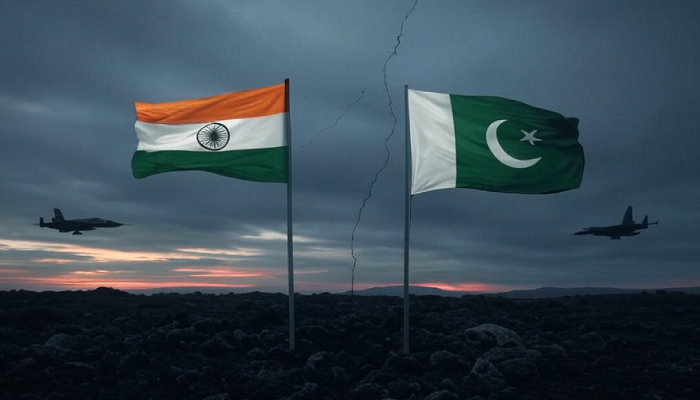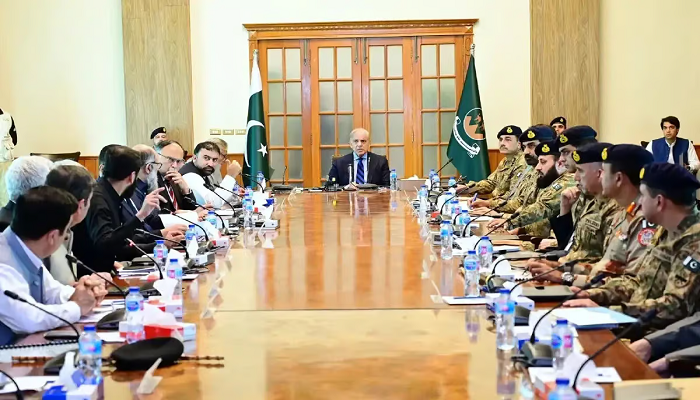Tensions between India and Pakistan have sharply escalated over the past week, with military skirmishes, mutual accusations of cross-border terrorism, and a series of retaliatory diplomatic measures.
The latest standoff centers on the disputed Kashmir region, where the April 22 attack in Indian-administered Kashmir left 26 dead, mostly tourists, fueling the already volatile relations between the two nuclear-armed neighbors.
Fighting has continued for five consecutive nights along the Line of Control (LoC), the de facto border separating Indian and Pakistani-controlled Kashmir. The Pakistani military reported shooting down an Indian surveillance quadcopter. India confirmed responding to “unprovoked” fire from Pakistani positions, though neither side has reported casualties.
Pakistan Navy Forces INS Vikrant to Retreat, Seeks Russia and China’s Role in Pahalgam Attack Probe
Pakistan’s Defence Minister, Khawaja Asif, warned that these incidents could lead to an all-out war, a sentiment echoed by the United Nations, which urged both nations to exercise maximum restraint.
The diplomatic fallout from the Pahalgam attack has been severe. India has accused Pakistan of sponsoring cross-border terrorism, linking Islamabad to the deadly assault in Kashmir without providing any concrete evidence. In response, Pakistan has strongly denied these allegations, calling for an independent, neutral investigation.
Both countries have expelled diplomats, revoked visas, and closed key border crossings. India has also suspended the Indus Waters Treaty, a 1960 agreement critical to Pakistan’s agriculture, prompting Islamabad to announce plans to take legal action at international forums.

In a dramatic move, Pakistan’s Director-General of Inter-Services Public Relations (ISPR), Lt Gen Ahmed Sharif Chaudhry, held a press conference on Tuesday, presenting what he described as “irrefutable” evidence of India’s involvement in state-sponsored cross-border terrorism against Pakistan.
He stated that while India had not provided any evidence to substantiate its accusations, Pakistan had uncovered detailed evidence of Indian military officers supporting terrorist activities inside Pakistan.
After Pahalgam Incident, India Unleashes Diplomatic Offensive on Pakistan, Islamabad Weighs Response
Lt Gen Chaudhry presented a case involving the arrest of Abdul Majeed, a suspected terrorist trained in India, who was caught near Jhelum on April 25. Security forces recovered 2.5 kilograms of explosive material, a drone from India, and over Rs 1 million in cash from his residence. Forensic analysis of Majeed’s communications revealed links to Indian military officers, including Major Sandeep Verma, Subedar Sukhwinder, and others.
Lt Gen Chaudhry explained how Indian military personnel were coordinating with terrorists to carry out bombings targeting both military and civilian sites in Pakistan.
Among the most alarming revelations were intercepted communications where Indian officers were directing terrorists to “cause civilian casualties in Pakistan” to tarnish the country’s image internationally.
Lt Gen Chaudhry further claimed that Major Sandeep Verma had orchestrated attacks from “Balochistan to Lahore” and detailed several IED attacks carried out by the terrorist cell, including the planting of explosives near military vehicles and schools.
The unfolding situation has sparked fears of an even broader military confrontation between India and Pakistan. With both nations now engaged in a high-stakes diplomatic and military standoff, the international community is closely monitoring the situation, urging restraint.
Despite India’s attempts to garner global support for its stance, the lack of solid evidence tying Pakistan directly to the Pahalgam attack raises questions about the veracity of India’s claims.
Pakistan Strikes Back: Closes Airspace, Suspends Trade, Rejects Water Treaty Suspension
The escalation has already disrupted peace agreements, with India threatening to abandon the 1972 Simla Agreement, a key framework for bilateral relations, while Pakistan has vowed to challenge India’s suspension of the Indus Waters Treaty.
As the two nuclear powers continue their standoff, global analysts are increasingly concerned about the risk of miscalculation and the potential for a devastating conflict in South Asia.



